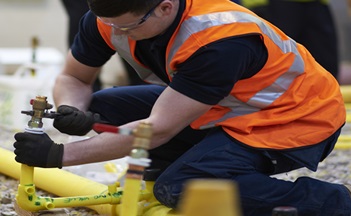A Continuous Flow Of Hot Water Training
Rinnai UK, a registered provider of CPD courses, has implemented a series of training modules which are specifically designed to engage with heating engineers &...
Read Full Article
Many air conditioning units may have been standing idle without being properly serviced, raising the risk that they could spread deadly Legionella.
The warning comes from national maintenance training expert Develop Training Ltd (DTL) that after a ‘washout’ July, many may not have been serviced with the accompanying risk that they could spread Legionella.
Legionella is a pathogenic group of Gram-negative bacteria that is responsible for the dangerous and often fatal, Legionnaire’s disease. The deadly condition, a rare form of pneumonia contracted when victims breathe in the bacteria in airborne water droplets, achieved notoriety after a string of high profile fatalities but has fallen off the radar in recent years as the number of cases in the UK has dwindled.
Nevertheless, these bacteria live naturally in environmental water sources but if they get into water systems in buildings they can cause a risk to humans through air conditioning systems, showers and spa pools. Legionella thrives in damp environments and during the warmer months, air conditioning units are a potential breeding ground.
Although forecasters predicting flaming temperatures in August have been proved wrong by dismal weather for the month, organisations are still being urged to ensure they are not putting workers at risk of what has been called a silent killer.
DTL, whose clients include major utilities, construction firms, health bodies and facilities managers, has published a new air-con safety guide for managers at http://resources.developtraining.co.uk/legionella-prevention-guide and urges organisations to carry out these three checks as a minimum:
Make sure central air conditioners have been professionally inspected and adjusted.
Unless it has been done in the past month, clean or replace the filter, evaporator and condenser coils and continue to do this monthly while the system is operating.
Ensure air conditioning systems were professionally cleaned and serviced before this summer, and make a note to have this happen every year.
This summer, DTL is organising a new range of training courses, created in partnership with The Chartered Institute of Environmental Health (CIEH). Its Legionella awareness qualification provides learners with an understanding of the risk, how to control it and the warning signs to look for in areas where the bacteria can replicate, providing employers with employee vigilance as the first line of Legionella defence.
The training covers steps that maintenance teams can take to keep their systems safe. These include:
Avoiding water temperatures and conditions that favour the growth of legionella and other micro-organisms.
Ensuring water cannot stagnate anywhere in the system by keeping pipe lengths as short as possible or removing redundant pipework.
Keeping the system and the water in it clean.
Treating water to either control the growth of legionella (and other micro-organisms) or limit their ability to grow.
Victoria Smedley, Delivery Manager, DTL, pointed out that many cases of Legionnaire’s Disease go unnoticed as the symptoms are similar to common pneumonia, and the risk remains. “In one case last year, at least four people contracted the condition after an outbreak at a factory in Boldon, South Tyneside,” she explained.
Picture: Air conditioning units should be checked regularly and professionally to prevent the at times deadly effects of Legionnaire’s Disease warns DTL
Article written by Cathryn Ellis | Published 28 August 2015
Rinnai UK, a registered provider of CPD courses, has implemented a series of training modules which are specifically designed to engage with heating engineers &...
Read Full ArticleMike Bullock from Corps Security outlines the changing landscape of security at a time of geopolitical and economic instability and how training practices must...
Read Full ArticleRichard Braid is the Managing Director of Cistermiser, a UK manufacturer of water and energy-saving management solutions for commercial and public sector...
Read Full ArticleA BBC investigation has found that some companies offering Level 2 SIA door supervisor qualifications are running shortened courses that are against...
Read Full ArticleHealth Secretary Steve Barclay has told the BBC’s Today programme that "no one has been harmed" after the presence of Legionella bacteria was...
Read Full ArticleA judge has fined a plastics manufacturing company in West Bromwich for failing to manage the risk of Legionella in its water cooling towers. Riaar Plastics Limited...
Read Full ArticlePeople studying for National Compliance and Risk Qualifications (NCRQ) courses are unable to access their student portal amidst rumours that the company has ceased...
Read Full ArticleAs part of a collaboration with Tent Partnership for Refugees, ISS has committed to hiring at least 1,000 refugees across its North America business by the end of 2025....
Read Full ArticleLarge areas of the UK are facing hosepipe bans, but with pipe leaks responsible for over 3 billion litres of water being lost every day, is the commercial property sector...
Read Full ArticleTo tackle the rising energy consumption of the majority of higher education institutions, SSE Energy Solutions is delivering decarbonisation training to FMs and Estates...
Read Full Article